Pitter Patter Plate
30-45 Minutes: 4 and up
Pitter Patter Plate

Intro
Combine art and science to teach about elements that resist one another! A perfect introduction to the crayon-resist technique, this activity will also help children build grasping and motor skills as they scrunch and grip paper towels for painting.
Set Up Ideas
You may wish to demonstrate a few samples of this artwork to give children ideas of the many possibilities that can be created.
Let’s Get Started
Ensure that each child has a paper plate, crayons, foam paint and paper towels ready. While foam paint is generally easy to manage, those paper towels may also prove handy at quickly cleaning up any accidental messes.
STEP 1
Using crayons, draw onto a paper plate in very thick layers. Then, roll out small air-dry putty coils and glue them onto the plate for added texture.
STEP 2
Make a palette of paint on a separate paper plate. Then, scrunch up the paper towels into loose rag balls. Practice pitter-pattering by dipping the towel into paint and patting onto paper in a light up-and-down motion.
STEP 3
After practicing the technique, repeat the process of dipping a scrunched paper towel in paint and pitter-pattering foam paint onto the crayon drawing, covering all areas.
STEP 4
Wipe off any excess foam paint with a paper towel. Rub or polish the crayon area so that all white spaces are filled. Finally, punch a hole and hang with cord.
If this is the children's first time doing a crayon-resist type of activity, they may be curious to learn how the crayon is not covered with the foam paint. Explain that wax is not soluble, meaning it doesn't break down in water, and the paint they are using is water-based.
![]()
Tips and Tricks
Older children who are more adept at patting the paint onto the plate may skip the practice portion of step three. For more experimentation with texture, try using cotton balls or pads to paint.
![]()
Follow up Activity
Explore other ways to paint with texture by adding flour to washable paint, or by using materials such as sponges, foam rollers and unconventional painting tools such as leaves or pinecones.


Comments are held for moderation, thank you.